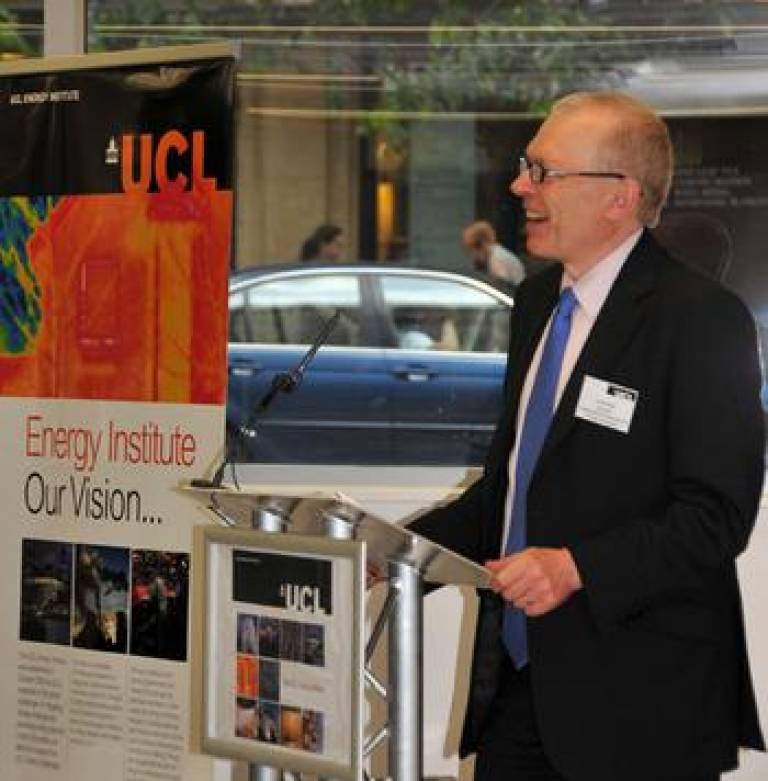UCL Energy Institute launch: Providing a blueprint for a low-carbon world
30 June 2009
Link:
 ucl.ac.uk/energy" target="_self">UCL Energy Institute
ucl.ac.uk/energy" target="_self">UCL Energy Institute
Giving the keynote speech at the launch of the UCL Energy Institute on 29 June 2009, Lord Hunt, Minister of State for the UK Department of Energy & Climate Change (DECC), said that high-quality academic research would provide the blueprint for a low-carbon world.
Lord Hunt described UCL as one of the finest universities in the world and expressed his delight that it was taking energy issues seriously. Three days earlier, the government had published 'The Road to Copenhagen', a document that makes the case for an ambitious agreement at Copenhagen in December 2009 and focuses on urgent action to limit global temperature increases to no more than two degrees Celsius.
Lord Hunt said that DECC would rely on expert advice in charting the pathway to the reduction of carbon emissions. He welcomed in particular the UCL Energy Institute's establishment of a UK Doctoral Training Centre in Energy-Demand Reduction & the Built Environment, a collaboration with Loughborough University. He said it would produce the next generation of energy experts necessary to engineer the fundamental scientific and social revolution.
Professor Malcolm Grant, UCL President and Provost, said that there was no greater challenge than that of energy as a focus of the talents of a leading university. The new UCL Energy Institute would enable UCL to draw on all its disciplines to address that challenge. It had relevance to and would impact on each of the UCL Grand Challenges: Global Health, Sustainable Cities, Intercultural Interaction and Human Wellbeing.
Professor Robert Lowe, Deputy Director of the UCL Energy Institute, reminded the audience - comprising academics, business delegates, representatives from local and national authorities as well as government agencies - of the benefits that fossil fuel had brought to humanity over the past two centuries. He said that the institute must now prepare the way for a reversal in the growth of consumption, and that its focus on energy-demand reduction would be crucial in this process.
The UCL Energy Institute
- Directed by Professor Tadj Oreszczyn, the UCL Energy Institute was established in October 2008 as UCL's response to the global challenges of mitigating climate change and providing energy security in the 21st century, as well as to support the UCL Grand Challenges.
- The institute coordinates and stimulates research on energy and carbon-emissions reductions across UCL, through building multidisciplinary teams around ambitious projects. It also acts as the public interface for energy research and related activities in UCL. It plays a leading role in advising government and industry through placing particular emphasis on data quality (by energy monitoring, analysis of existing datasets and model construction) and its use in evidence-informed policy and decision-making.
- The institute's work covers: the carbon intensity of energy, from legal frameworks for carbon capture and storage to micro combined heat and power (micro-CHP) field trials; the energy intensity of services, from regulations for building thermal efficiency to modelling demand for transporting people and goods; and the consumption intensity of users, from understanding consumer response to price signals to behavioural responses to building-control systems.
- Funded by the Engineering & Physical Sciences Research Council, the UK Doctoral Training Centre in Energy-Demand Reduction & the Built Environment will produce the next generation of highly skilled and broadly educated energy researchers to lead and support the complex, multidisciplinary task of driving down energy demand and CO2 emissions of the UK building stock.
-
UCL is committed to using its vast range of expertise to improve humanity's circumstances, initially around the Grand Challenges of Global Health, Sustainable Cities, Intercultural Interaction and Human Wellbeing. The underlying philosophy of Grand Challenges is that solutions to complex and systemic problems emerge only when different kinds of expertise and methodologies are brought together: that our collective wisdom is greater than the sum of our expertise.
Images (from top): Lord Hunt; Professor Grant; and Professor Lowe
 Close
Close

